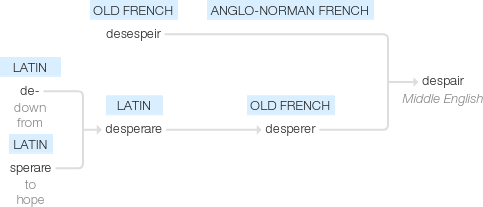Despair
Middle English: the noun via Anglo-Norman French from Old French desespeir ; the verb from Old French desperer, from Latin desperare, from de- ‘down from’ + sperare ‘to hope’.
wiktionary
From Middle English dispeir, from Anglo-Norman despeir and Old French desperer (from Latin despero, desperare), or desesperer, from des-(“dis-”) + esperer(“hope”). See also desperate
etymonline
despair (v.)
"to lose hope, be without hope," mid-14c., despeiren, from Old French despeir-, stressed stem of desperer "be dismayed, lose hope, despair," from Latin desperare "to despair, to lose all hope," from de "without" (see de-) + sperare "to hope," from spes "hope" (from PIE root *spes- "prosperity;" see speed (n.)). Related: Despaired; despairing; despairingly.
despair (n.)
c. 1300, despeir, "hopelessness, total loss of hope," from Anglo-French despeir, Old French despoir, from desperer (see despair (v.)). The native word was wanhope.
Despair naturally destroys courage and stops all effort, but may produce a new kind of courage and fierce activity founded upon the sense that there is nothing worse to be feared. In this despair is akin to desperation, which is an active state and always tends to produce a furious struggle against adverse circumstances, even when the situation is utterly hopeless. [Century Dictionary, 1897]
